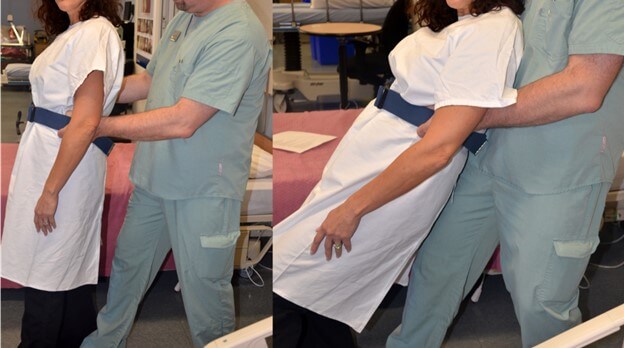A client has had an above-the-knee amputation and complains of pain distal to the amputation.
What type of pain is the client experiencing?
Nociceptive
Neuropathic
Cutaneous
Visceral
The Correct Answer is B
The client is experiencing neuropathic pain.
Pain after amputation can involve both nociceptive pain due to bone and soft tissue injury and neuropathic pain from direct neural trauma and central sensitization1.
This can lead to a complicated, mixed form of pain.
Choice A is not the correct answer because nociceptive pain is not the only type of pain that can occur after amputation.
Choice C is not the correct answer because cutaneous pain is not the type of pain being described.
Choice D is not the correct answer because visceral pain is not the type of pain being described.
Nursing Test Bank
Naxlex Comprehensive Predictor Exams
Related Questions
Correct Answer is C
Explanation
The priority nursing intervention when a client begins to fall while ambulating is to guide the client safely to the floor.
This can help prevent injury and ensure the safety of the client.

CHOICE A. Initiating a code is not necessary for this situation as it is not a medical emergency.
CHOICE B AND D : Calling the charge nurse or the client’s doctor may be appropriate after the client has been safely guided to the floor and their condition has been assessed
[B] [D].
Correct Answer is D
Explanation
Inform the client that driving would be dangerous.
Narcolepsy is a sleep disorder characterized by excessive daytime sleepiness and sudden attacks of sleep.
As a result, it can be dangerous for individuals with narcolepsy to engage in activities that require sustained attention and alertness, such as driving.
The nurse’s priority intervention would be to inform the client of this risk and advise them to avoid driving.

Choice A is not an answer because while avoiding caffeine after 6 pm may help improve sleep quality, it is not the priority intervention for a client with narcolepsy.
Choice B is not an answer because drinking two cups of regular coffee may worsen the symptoms of narcolepsy and is not a recommended intervention.
Choice C is not an answer because while participating in normal activities may be beneficial for overall health and well-being, it is not the priority intervention for a client with narcolepsy.
Whether you are a student looking to ace your exams or a practicing nurse seeking to enhance your expertise , our nursing education contents will empower you with the confidence and competence to make a difference in the lives of patients and become a respected leader in the healthcare field.
Visit Naxlex, invest in your future and unlock endless possibilities with our unparalleled nursing education contents today
Report Wrong Answer on the Current Question
Do you disagree with the answer? If yes, what is your expected answer? Explain.
Kindly be descriptive with the issue you are facing.
